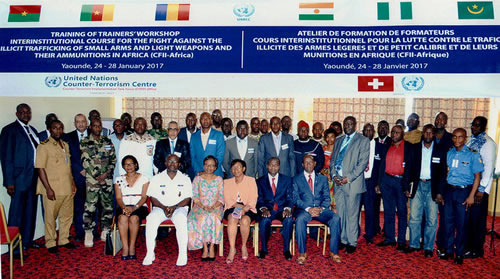 Formerly restricted mainly to North Africa, violent Islamic extremism now forms a strategic African continuum from West to East, with the Sahelian zone and the Lake Chad Basin emerging as prime areas. This extremist violence is fueled by the continuing inflows of foreign terrorist fighters (FTF).
Formerly restricted mainly to North Africa, violent Islamic extremism now forms a strategic African continuum from West to East, with the Sahelian zone and the Lake Chad Basin emerging as prime areas. This extremist violence is fueled by the continuing inflows of foreign terrorist fighters (FTF).
In the Lake Chad basin region where a wave of violence is threatening Nigeria, Niger, Cameroon and Chad, these FTF are benefitting from the proliferation, diversion and illicit trafficking of Small Arms and Light Weapons (SALW) and their ammunition to strengthen their capabilities and means of control.
United Nations Security Council Resolution 2178 (2014) calls for the elimination of conditions conducive to the spread of terrorism. As it contributes to the implementation of the Resolution, the United Nations Office for Disarmament Affairs (UNODA) developed the “Regional Support to the Counter-Terrorism Task Force (CTITF)” project, with the components on disarmament and non-proliferation of SALW entrusted to the United Nations Regional Center for Peace and Disarmament in Africa (UNREC).
The project aims to develop a comprehensive approach to addressing the issue of illicit flows of weapons and ammunition acquired by armed groups through the provision of technical assistance at the regional level and strengthening the capacities of six beneficiary countries in the Lake Chad Basin region, namely Cameroon, Chad, Niger and Nigeria, Burkina Faso and Mauritania.
From 4th to 5th August 2016, UNREC in collaboration with the ECOWAS organised an experts’ meeting on improving cross-border sub-regional cooperation in the control of small arms and light weapons under existing regional and sub-regional instruments. The meeting took place at the ECOWAS Parliament in Abuja, Nigeria.
The experts’ meeting aimed at strengthening sub-regional efforts in the area of judicial and military cooperation to combat terrorism by preventing the acquisition of small arms and light weapons by terrorists in the four beneficiary States. It provided a first platform for stakeholders to identify existing gaps in the legislative and judicial systems dealing with international cooperation in small arms control at both national and regional levels.
From 24th to 28th January 2017, UNREC in collaboration with the Government of Cameroon organised a second workshop in Yaounde. This was a Training of Trainer’s Workshop financed by the United Nations Counter-Terrorism Center (UNCTC) on the inter-institutional course for the fight against the illicit trafficking in SALW, as part of the national capacity building programs for the countries of the Lake Chad Basin affected by the phenomenon of Boko Haram.
These workshops brought together national and international experts on improving cross- border and sub-regional cooperation for control of SALW trafficking in relation to existing regional and sub-regional instruments.
Participants were given a comprehensive training of six modules contained in the draft Trainer’s Handbook for the Inter-Institutional Course on Combating Illicit Trafficking in SALW developed by UNREC including: International instruments and normative framework; Identification of SALW and their parts; ammunition and explosives; Management and Destruction of SALW Stocks, Their Ammunition, Parts, and Elements; Practical Disarmament Measures; Intelligence and investigation to combat illegal trade.
The various presentations of all the modules were the subject of in-depth technical discussions, as well as the exchange of experiences and best practices. This approach contributed significantly to further strengthen participant’s knowledge on the various aspects of the fight against trafficking in SALW.
Recommendations were put forward in order to improve the manual, the training programme and most importantly the dialogue between collaborators. These discussions also helped to highlight the importance role not only of the civil society during this process, but also all the state actors participating in the fight against the proliferation and illicit trade of SALW, the private sector, economic actors and other authorised dealers and users of weapons as well.
Links to related documents
• Photos from the Event: www.goo.gl/0frWyH
 Who we are
Who we are  Newsletter/UNREC Focus
Newsletter/UNREC Focus  Contact Us
Contact Us  Overview
Overview  Specific Projects
Specific Projects  Calendar of Events
Calendar of Events  Useful Links
Useful Links  Employment
Employment  Rosters of Experts
Rosters of Experts  Internships
Internships 